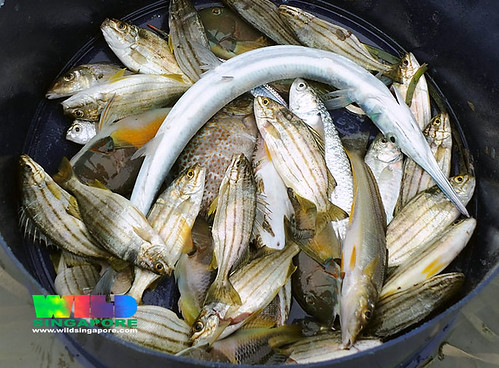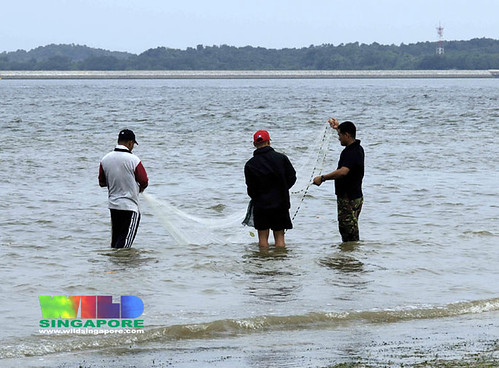
There were people fishing near the 'No Fishing' sign at West Coast Park and A STOMPer who witnessed this was shocked by their behaviour.
In his email to STOMP today (Mar 7), the STOMPer wrote:
"This picture was taken at the West Coast Park.
"The signboard put up by NParks says: 'Fishing is not allowed at this look-out point'.
"Just beside the look-out point, two men were busy casting their lines into the sea and within minutes they caught some fish.
"The danger was that the pleasure boats were moored near the shore and if the anglers were not careful their hooks might get entangled with the boat owners and their boats."

Selective vision is quite a common disease that afflicts many anglers in Singapore.
I'm not familiar with West Coast Park, but here is a post that gives a brief overview of the sort of shore habitats that can be found there.
West Coast Park Beach
The person who submitted this post to STOMP was concerned about fishing hooks getting tangled up with boats, but failed to notice the most obvious problem - that of the threat to marine life.
Unfortunately, other posts about West Coast Park clearly show the threats faced by Singapore's marine life. Littering is one issue that is all too commonly encountered all over Singapore's coasts. Anglers themselves often contribute to the problem, with discarded fishing lines, nets, newspapers, plastic bags and wrappers, food wrappers, drink cans and bottles, lightsticks and even fishing hooks often being encountered on the beach. Not only is such litter an eyesore, it also entangles and kills other creatures. In other countries, some of the commonly publicised victims include sea turtles, dolphins, sealions, and dugongs, while here in Singapore, such trash kills animals as diverse as herons, monitor lizards, crocodiles and horseshoe crabs.




The curse of driftnets.
Upper left: Brown egg crab (Atergatis floridus), Sentosa;
Upper right: Ornate spiny lobster (Panulirus ornatus), St. John's Island;
Lower left: Coastal horseshoe crab (Tachypleus gigas), Changi;
Lower right: Blue-spotted fantail ray, (Taeniura lymma), Chek Jawa;
(Photos by Ria)
Indiscriminate and excessive collection is a serious problem, and it is unfortunate that far too many people are choosing to keep everything they catch, even young and undersized individuals, jeopardising the sustainability of local populations of various marine creatures.
West Coast fishing - 7 bags full and scubatanks even
over-indiscriminate fishing?
How much longer can our marine life withstand such a relentless onslaught? Singapore lacks a proper Marine Protected Area (MPA), and even places like Chek Jawa and Pulau Semakau are targeted by poachers. We cannot keep decimating places like Changi every low tide, and then expect them to be replenished with dispersal from surrounding areas. Malaysia and Indonesia are already facing their own problems with coastal development, pollution and overharvesting of marine life. It is extremely foolish to assume that such practices can go on indefinitely without having a serious long-term impact on marine ecosystems.
Seriously, how much more exploitation can our marine ecosystems withstand?

Drift net on Pulau Semakau
(Photo by Ria)

Bucket full of fish caught by the drift net on Pulau Semakau
(Photo by Ria)

Cast nets being used on Chek Jawa
(Photo by Ria)

Harvesting clams on Pulau Sekudu
(Photo by Ria)
We need to regulate the behaviour of irresponsible anglers and fishermen, and to step up surveillance and enforcement. I also think it's about time that responsible anglers show that they are capable of working together with the marine conservation community for the benefit of Singapore's marine ecosystems. Stronger emphasis should be placed on catch and release, and the practice of throwing back undersized individuals and breeding females should be encouraged. Education is important, but at the same time, it is useless if people don't realise that these laws are to be taken seriously.
I am not against fishing, but this sorry state of affairs cannot be allowed to continue. The threat posed by the often myopic, selfish and irresponsible behaviour of many local fishermen and anglers cannot be ignored. These individuals, who act without care and regard for the sustainability and future of the species they so mercilessly exploit, smear and tarnish the reputation of responsible anglers, and it is time that we put our foot down and refused to tolerate such wanton desecration and destruction of our natural heritage.